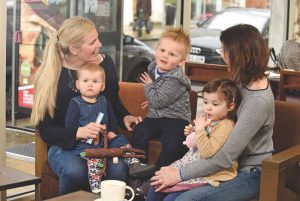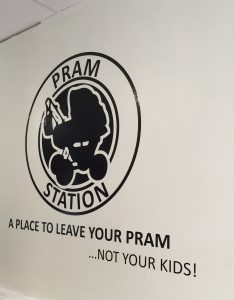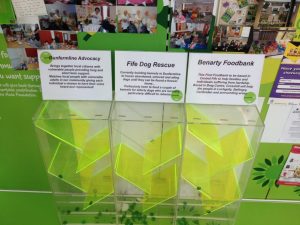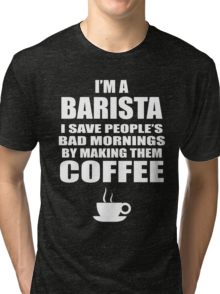 Cupcake Coffee Box located at The Macdonald Mall Kirkcaldy (fomerly the Old MacDonald’s restaurant on the high street). This award winning coffee shop is a great social hub allowing customers to enjoy great coffee.
Cupcake Coffee Box located at The Macdonald Mall Kirkcaldy (fomerly the Old MacDonald’s restaurant on the high street). This award winning coffee shop is a great social hub allowing customers to enjoy great coffee.
Cupcake Coffee Box located at The Macdonald Mall Kirkcaldy is a great social hub allowing customers to enjoy great coffee as well as a place to meet and socialise with friends and colleges and work mates.
This award winning coffee shop is bursting with activities. Activities that allow customers to meet and enjoy great events such as Book Clubs, Wine Tasting, and many more community activities that can be viewed on Cupcake Coffee Box’s great calendar of activities and entertainment.
Cupcake Coffee Box understand the high street is changing and coffee shops are  now community hubs providing an important heart to the high street with more and more people seeing the high street as a place of leisure and recreation boosted by people shopping more online. Instead of spending their Saturdays trawling the shops, Scotts are meeting up with friends at their local coffee shop.
now community hubs providing an important heart to the high street with more and more people seeing the high street as a place of leisure and recreation boosted by people shopping more online. Instead of spending their Saturdays trawling the shops, Scotts are meeting up with friends at their local coffee shop.
Customers think of the coffee shop as a social venue. Early market data into this  is believed to centre around the growth of female independence and female spending power. With some studies reporting over half of the customers to these coffee shops are women.
is believed to centre around the growth of female independence and female spending power. With some studies reporting over half of the customers to these coffee shops are women.
People talk about the pub as a meeting point but pubs were more about males in the evening, coffee shops are [ope n] all day, more female [orientated] and certainly more family friendly.
n] all day, more female [orientated] and certainly more family friendly.
Cupcake Coffee Box is part of a growing number of coffee shops that are engaging customers at all levels and creating spaces for friends, business and families to meet and enjoy great coffee and great company.


 our
our  more so than how we enjoy coffee, with more people purchasing barista style machines for their homes and purchasing more and more international origin coffees and customers are expecting more.
more so than how we enjoy coffee, with more people purchasing barista style machines for their homes and purchasing more and more international origin coffees and customers are expecting more. transforming from a pure shopping destination to a centre for “leisure and services” as the dramatic rise of the Internet changes the retail landscape demand for high-quality, barista-style coffee in the home has risen in recent years and this has led to innovation in manual, bean-to-cup and capsule coffee machines for the home. This is also helping independent coffee chains to better develop their brand around individual coffee blends.
transforming from a pure shopping destination to a centre for “leisure and services” as the dramatic rise of the Internet changes the retail landscape demand for high-quality, barista-style coffee in the home has risen in recent years and this has led to innovation in manual, bean-to-cup and capsule coffee machines for the home. This is also helping independent coffee chains to better develop their brand around individual coffee blends. The role of technology in food service has changed dramatically in the past few years, and no more than in the UK, where mobile technology has infiltrated many aspects of regular consumer behaviour with a new generation of gourmets is emerging in the UK aged 18- 35 years old. These consumers are keen on food with an authentic or distinctive positioning, supporting sales growth for imaginative start-ups and independents.
The role of technology in food service has changed dramatically in the past few years, and no more than in the UK, where mobile technology has infiltrated many aspects of regular consumer behaviour with a new generation of gourmets is emerging in the UK aged 18- 35 years old. These consumers are keen on food with an authentic or distinctive positioning, supporting sales growth for imaginative start-ups and independents. Niche products based around transparency developing the power of the Independent food companies that provide original products that are fresh with local grounding and have international culture are offering a great alternative to existing chains.
Niche products based around transparency developing the power of the Independent food companies that provide original products that are fresh with local grounding and have international culture are offering a great alternative to existing chains. rk in this field are creating and developing framework to create a unique supply chain that offers transparency as well as a fair distribution of profit.
rk in this field are creating and developing framework to create a unique supply chain that offers transparency as well as a fair distribution of profit.
 you are the last link in a chain, the focus and point of connection, and you will have understood that focus is the representation of a global supply chain – that you are happy to represent.
you are the last link in a chain, the focus and point of connection, and you will have understood that focus is the representation of a global supply chain – that you are happy to represent. We are looking for baristas to create their special coffee blends as well as develop their influence within their working environment, to advise customer coffee shop owners in how best to develop their coffee blend around the Blendly ecosystem.
We are looking for baristas to create their special coffee blends as well as develop their influence within their working environment, to advise customer coffee shop owners in how best to develop their coffee blend around the Blendly ecosystem.



 Coffee shops are about work in another way, too – the rise of the “gig economy”. The proliferation of freelance workers. Digital contractors and entrepreneurs who don’t have an office and can’t afford to rent one – has been crucial in shaping their new role.
Coffee shops are about work in another way, too – the rise of the “gig economy”. The proliferation of freelance workers. Digital contractors and entrepreneurs who don’t have an office and can’t afford to rent one – has been crucial in shaping their new role.

 business to meet the local demand. This thriving business grew and continues today. Through seeking the finest green coffees from around the world, they blend, roast and package fine espresso coffee that makes Kimbo a leader in the Italian market. Today, Kimbo exports successfully in many countries and here in London we are proud to represent this wonderful business and convert the public to the finest coffee experience possible- espresso Italiano!
business to meet the local demand. This thriving business grew and continues today. Through seeking the finest green coffees from around the world, they blend, roast and package fine espresso coffee that makes Kimbo a leader in the Italian market. Today, Kimbo exports successfully in many countries and here in London we are proud to represent this wonderful business and convert the public to the finest coffee experience possible- espresso Italiano!